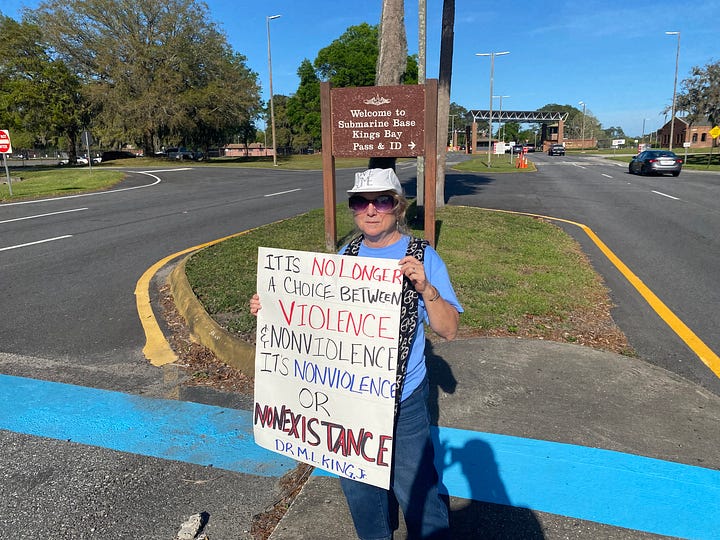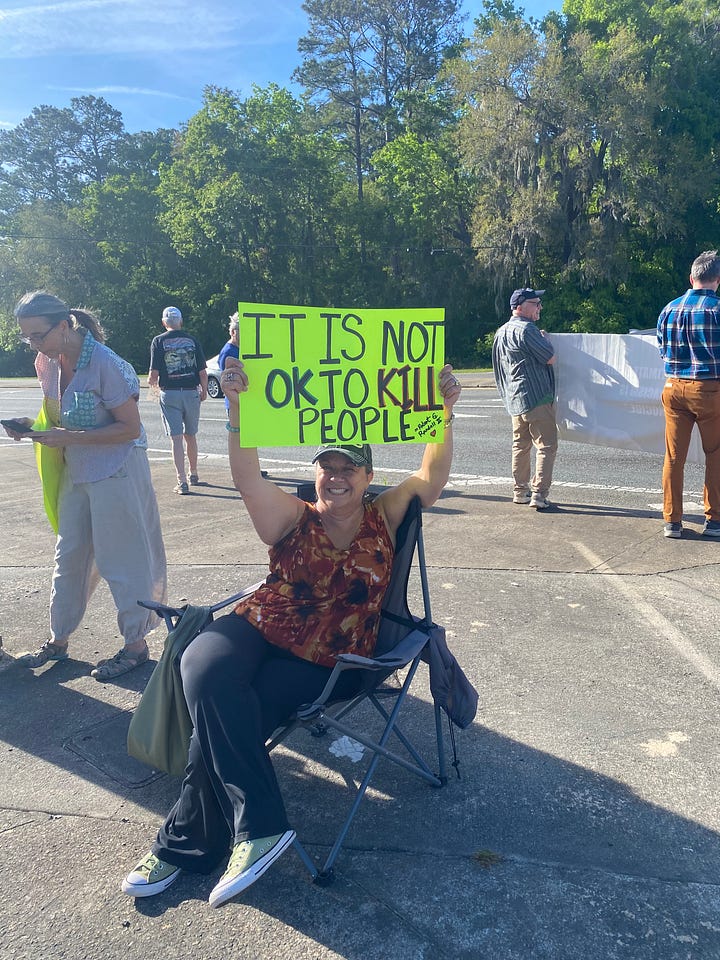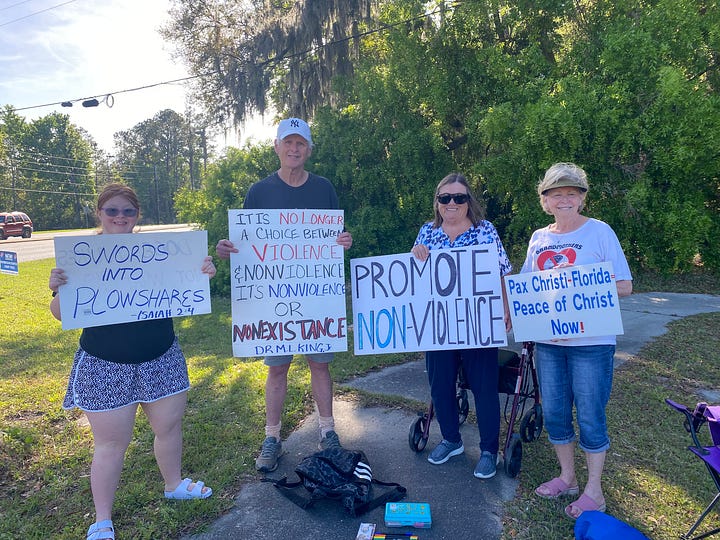Building The Upside Down Kingdom
Catholic Workers gather in New York for Dorothy Day Symposium; Dawn McCarty discusses solidarity and the precarity of migrants; Kings Bay 7 celebrate their Ploughshares Action's anniversary.

The Importance of Hand-Washing the Dishes
“It is good to keep the hospice small and to maintain a family atmosphere,” Stanley Vishnewski advised people starting a Catholic Worker community back in the 1960s. “Our present hospice in New York City is much too big.”
It’s “upside-down” advice that puzzles some folks; why not build bigger, they wonder, since the need is so great? This is why some charitable organizations build larger operations; here in Minnesota, I think of the Dorothy Day Center in Saint Paul and Caring & Sharing Hands in Minneapolis, both of which do great and much-needed work.
So why does the typical Catholic Worker follow Stanley’s “small family atmosphere” advice?
The answer to that question can best be had by getting yourself to one of those “family style” Catholic Worker houses for a meal, then staying afterward to do the dishes, preferably alongside some of the guests.
Spend the better part of an hour in this sudsy camaraderie and you may have an epiphany: “Ah, so this is what they’ve been going on about!” Not always, but often, this is surprisingly joyful work. You thought this was going to be a “chore” in the worst sense of the word—toil, as it were. Instead, the next time you approach the sink, you might be inclined to remove the sandals from your feet, this being the closest to hallowed ground you’re probably going to walk on, this side of heaven.
I’m thinking about the importance of hand-washing the dishes with other people because of the lovely story in today’s newsletter about the San Antonio Catholic Worker. (See “He Tried Closing a Catholic Worker. Now, He Shelters the Homeless,” below.) As they moved into their new digs, the San Antonio CWers were offered a brand-new, high-capacity dishwasher. They turned it down, according to the article, on the grounds that “washing dishes embodied the Catholic Worker value of manual labor and built community.”
Exactly, and then some. People need to be fed and sheltered, yes. But we also need the warmth of human connection, a need that is often underappreciated. Studies show that infants who experience low engagement with adult caregivers (as in some of the institutional orphanages of decades past) have higher levels of stress hormones in their systems even years after being adopted. Infants who receive high levels of engagement and skin-to-skin contact (hugging, cuddling), by contrast, blossom and thrive.
Over the years that I’ve washed dishes alongside other volunteers and guests at the Catholic Worker, I’ve come to believe that meeting this deep hunger and thirst for this human contact is often even more important than the food and drink we serve at the table—not just for our guests, but for all of us.
The importance of the personal connections made at the kitchen sink, the table, and the porch is why the Catholic Worker has long advocated small, family-like “hospices.” And as for the question of numbers, Stanley reminds us, “It is the dream of the Catholic Worker that a hospice will be part of every Catholic parish in the world.” We could amend that to include every house of worship in the world.
It’s not an impossible dream: this isn’t rocket science, nor are Catholic Workers unusually holy or especially talented (sorry, y’all). All we really lack is a little holy foolishness. “The Lithuanians have a saying: Ged who gave the teeth will provide the bread,” as Stanley says.
Well. For now, maybe it is enough to run a little hot water, pick up a towel, and begin washing the dishes.
—Jerry
FEATURED
Long Read: Dispatch from the Dorothy Day Symposium
In Friday’s CW Reads (you can subscribe to this section here), Roundtable shared a report from the Dorothy Day Symposium at Manhattan University in the Bronx. About 40 people gathered in a conference room at Manhattan University’s student center to discuss the example of Dorothy Day’s prophetic life, particularly in the Jubilee Year of Mercy. A keynote by Robert Ellsberg, publisher of Orbis Books, and five panels discussed Day’s prophetic witness of peace-making, pilgrimage, prophecy, work and as a promoter of the holiness of the lay vocation. Read the full report here.
Long Read: USAID and the Precarity of Solidairty
Thursday’s CW Reads spotlighted an analysis of the price of cutting USAID on the guests of Bahay Nazareth in Manila and an essay of Dawn McCarty’s from an upcoming issue of the Houston Catholic Worker. In her article, Dawn proposes that a spiritual work of mercy we can offer our immigrant neighbors is simply bearing the cross of danger and precariousness that they have carried with them many miles to the U.S.A., and that they continue to carry. Read the full story here.
COMMUNITY NEWS & NEWSLETTERS
The Catholic Worker Hits Newsstands
The March-April edition of The Catholic Worker opens with an account of the Holy Triduum at Maryhouse by longtime St. Joseph House resident Jim Reagan. They also share an article by Alessandra Harris on Jordan Neely, the Black man killed in a crowded subway car by a former US Marine. A Regis student shares his reflections on hospitality, and Liam Myers writes about bokashi, the compost fermentation technique that has also taken the Harrisburg Catholic Worker by storm (our elementary school volunteers were unimpressed with its potent smell). You can subscribe to the Catholic Worker newspaper via this form or drop them a line on Instagram.
April Catholic Citizen Available Online
The Center for Catholic Social Thought, whose director, Colin Miller, lives at Maurin House in St. Paul, Minnesota, has published its April edition of the Catholic Citizen, edited by fellow Maurin House community member, Tyler Hambley. It includes an essay by Hambley on suspicion, which breed competition versus community, which builds trust. Another essay introduces readers to Korean-German philosopher Byung-Chul Han, who advocates for contemplation as a cure for digital malaise. Finally, a contributor takes a stab at writing his own Easy Essay (Peter Maurin would be proud): “Institutions do not see persons/ They see averages/ But no person/Is an average.” Read the whole issue online.
Lydia’s House Spotlights Redlining; Offers “Roundtable” on Trump
Lydia’s House new winter newsletter covers a wealth of activity at the Cincinnati house, with an essay from a summer intern, a three-page update on the house’s summer and autumn events, a provocative vox populi survey of their guests and volunteers on their voting preferences, and an essay on single-family home zoning and how its history, stemming from the Great Migration, perpetuated a Jim Crow-style segregation in the North. Mary Ellen Mitchell writes:
“Left with no way to stop trainloads of Black families from getting off in their neighborhood, white people could either move to suburban outposts (white flight is a commonly known phenomenon) or work a bit harder and make it difficult for those arriving with no job to find a place to live affordably. Read the full newsletter here.
Spring Regenerative Reader: Virtual Events & Farm Update
The Spring 2025 Regenerative Reader from Maurin Academy is now online. “Spring has sprung here on the farm in Kansas City!” they share in a John Paul II Catholic Worker Farm update. “Our garlic and spinach survived the winter, and our community has been more motivated than ever to get cleaned up, organized, and ready for the year ahead.” Read the full edition here.
Simone Weil Catholic Worker Community Seeks Live-in Member
Simone Weil Catholic Worker in Portland, Oregon, seeks full-time, live-in community members. The community combines prayer, hospitality, manual work, and study inspired by Benedictine spirituality and the radical Gospel vision of Peter Maurin in their life across two houses, their gardens, and a free neighborhood pantry and clothing closet. Prospective community members should be eager for communal life, Eastern Christian liturgy, and mutual-aid economic practices, and possess a sense of humor and flexibility. Read the full description and apply here.
CW IN THE MEDIA




Activists Honor Anniversary of Kings Bay Ploughshares Action
Several members of the Kings Bay Ploughshares 7 and friends gathered in Kings Bay Nuclear Base in southern Georgia on April 4, to mark the seventh anniversary of their 2018 action and to commemorate the fifty-seventh anniversary of the assassination of Martin Luther King Jr.
He Tried Closing a Catholic Worker. Now, He Shelters the Homeless
An unlikely alliance between a city official and the Dorothy Day House of Hospitality in San Antonio, Texas, made the city’s first permanent supportive housing development for homeless seniors a reality, according to a recent article in Faith & Leadership, a publication of Duke Divinity School.
The article spotlights Chris Plauche, longtime leader of the San Antonio Catholic Worker House, and Edward Gonzales, a former city official who once tried to shut it down. Despite a rocky start, the two joined forces to build Towne Twin Village, which will eventually house more than 200 formerly homeless adults over age 55. Read the full story and see photos at Faith & Leadership.
Kelly: NYC Vigil Highlights the Real Crisis in U.S.’s Yemen Policy
Since 2017, New York Catholic Workers have joined other peace activists in gathering weekly in Manhattan’s Union Square to protest the devastating humanitarian crisis in Yemen, recently intensified by U.S. airstrikes targeting Houthi forces. Kathy Kelly, writing in the March 30 Countercurrents, notes that half of Yemeni children under five suffer severe malnutrition, with one dying every ten minutes from preventable causes. Read Kelly’s full essay, “The Real Outrage in Yemen.”
Romero House Shows Ames Hospitality
“In February, the Ames City Council considered developing an ordinance that would prohibit camping on public property. After about an hour of discussion, the item was ultimately tabled,” according to a profile of the Romero House in Ames, Iowa, in the Ames Tribune. Romero House’s hospitality model provides an inspiring contrast to policies that punish homeless Americans with tickets, sweeps, or fines. Read the full story here.

WORDS FROM THE ELDERS
Dorothy Day’s Reflections on Jail
by Dorothy Day, from Dorothy Day: Spiritual Writings by Orbis Books
When I went to jail in the fifties, for civil disobedience-and a few of us were arrested each year for six years —I felt glad as I entered my cell that now at last I could be really poor for a time, for a day, a week, or a month, that for no matter how small a time, I was at last sharing the little misery of the poor.
In a way it was true. I was stripped, prodded and searched for drugs, pushed from here to there, interminably, caged half the 24 hours like a wild beast-yes, I had just enough of it to teach me to suffer more keenly for the rest of my life over the plight of the prisoner. And not only the grown prisoners but the little children, in their detention homes, "youth houses," or whatever the city and state call them. And what of the refugee? The "displaced," the "relocated"?
Being in prison was dramatically to be "poor," but I soon reached out for the luxuries of something to read, the letters sent in to me, something to eat. Yes, as soon as I was permitted to go to the commissary I got me a jar of instant coffee and so could indulge myself early mornings before the cells were unlocked, with the luxury of hot water from the tap (think of it, an open toilet in the cell, and tiny wash-bowl).
How can I condemn the expensive drinks of the activists in the peace movement when I myself hang on to my comfort, my own addiction—"judge not."
I am convinced that prayer and austerity, prayer and self-sacrifice, prayer and fasting, prayer, vigils, and prayer and marches, are the indispensable means. ... And love. All these means are useless unless animated by love. "Love your enemies." That is the hardest saying of all.
Please, Father in Heaven who made me, take away my heart of stone and give me a heart of flesh to love my enemy.
It is a terrible thought-"we love God as much as the one we love the least."
Dorothy Day to Mike Cullen, February 1970, All the Way to Heaven
About us. Roundtable is a publication of catholicworker.org that covers the Catholic Worker Movement.
Roundtable is independent of the New York Catholic Worker or The Catholic Worker newspaper. This week’s Roundtable was produced by Renée Roden and Jerry Windley-Daoust. Send inquiries to roundtable@catholicworker.org.
Subscription management. Add CW Reads, our long-read edition, by managing your subscription here. Need to unsubscribe? Use the link at the bottom of this email. Need to cancel your paid subscription? Find out how here. Gift subscriptions can be purchased here.
Paid subscriptions. Paid subscriptions are entirely optional; free subscribers receive all the benefits that paid subscribers receive. Paid subscriptions fund our work and cover operating expenses. If you would like to stop seeing Substack’s prompt to upgrade to a paid subscription, please email roundtable@catholicworker.org.





